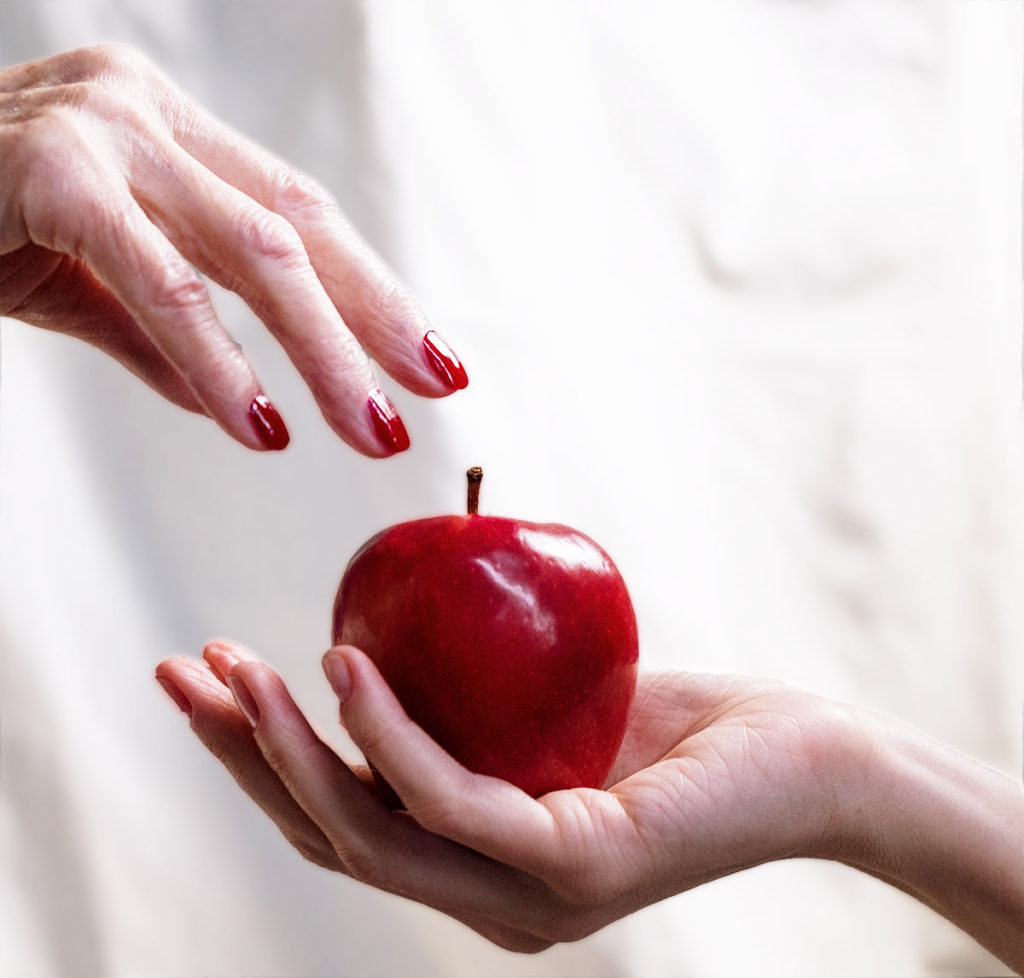
Anti-aging is not only for people who are afraid of aging. It is important to pay attention to the health and integrity of the skin and not to stress it unnecessarily. Sunscreens and moisturizers are especially helpful in this regard, to help protect against UV radiation and irritation, but algae anti-aging products can also play a preventive role, and support the skin.
In terms of anti-aging, algae always offer new innovative approaches through their maritime ingredients, which are just waiting to be explored and used. But what is the demand for such products? How does skin age and why can algae anti-aging products help slow down the process?
What does the market for anti-aging products look like?
Anti-aging products, along with moisturizers and sunscreens, arguably take the largest market share in the commercial skin care product segment. In 2016, the market volume of anti-aging products in Germany was estimated at $1.5 billion (source: Euromonitor; ISAPS), a growth of 21% with respect to the reference year 2011 (source: Euromonitor; ISAPS). So the demand for anti-aging products cannot be overlooked, and will continue to accompany us in the coming years. In this context, algae anti-aging products can offer a sustainable supplement.
How does the skin age?
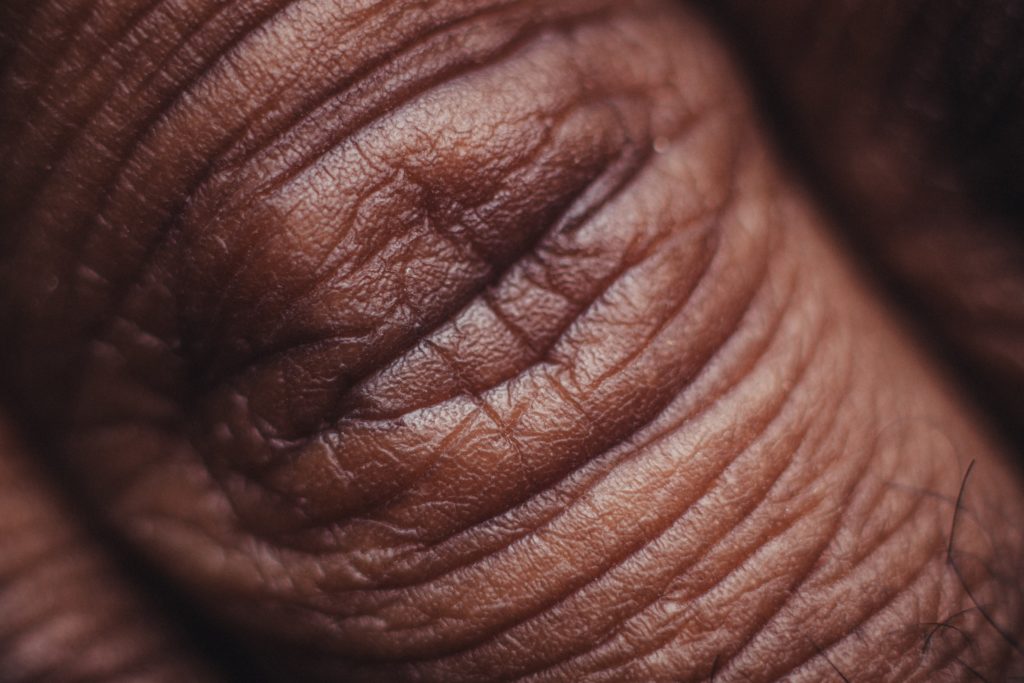
To better understand how anti-aging products work and what ingredients are useful, it is useful to first look at how the skin ages in the first place.
Like all cells, the cells in the skin are subject to the aging process. Although they are constantly renewed, the skin continues to lose its elasticity over the years. The connective tissue, the elastic fibers as well as the skin fat decrease and the skin appearance becomes more wrinkled.
This process is natural and cannot be completely stopped, nor can it be comprehensively reversed. It is important not to make empty promises to the consumer, which contradict the biological facts. However, it is possible to slow down the aging process and preventively ensure that the skin remains young and elastic for as long as possible.
How does the aging of the skin become noticeable?
The aging of the skin is a slow process and accordingly it is only noticeable over a longer period of time. Typically, the first wrinkles can become noticeable from the age of 25. However, this is only a reference value and is influenced by many different factors.
As we age, the elasticity and thus the tension of the skin continues to decrease, causing the wrinkles to become deeper and the skin to sag. Often these wrinkles run parallel to the body’s skin tension lines, as these are already the least stretchable parts of the skin. The sagging can cause “drooping” skin in some areas of the body, which is further aided by the loss of volume of the skin.
Another possible consequence of skin aging is dryness, as regulation decreases with age, and the endogenous moisturizing processes of the skin diminish.
What accelerates the aging of the skin?
The effect of skin aging, as already mentioned, is influenced by various external and internal factors. Some of them can be limited or completely avoided, others are inevitable.
External influences
The sun and its UV radiation are one of the biggest and most significant factors in skin aging. UV radiation damages the integrity of the skin and thus accelerates the aging process. If you want to know more details about the effect of the sun on our skin, and the possibilities of natural sun protection from algae, you can find more information about it in our blog “Algae Sunscreen – Natural Protection From The Sun“.
Another external factor is oxidative stress, which is caused, for example, by air pollution and other environmental factors. Due to the free radicals that are released by the environmental influences in our bodies, it comes not only to damage the skin, but in the entire body and damage the cells as well as the genetic material (DNA).
Also, lack of or inadequate care with the appropriate routines and products can cause the skin to age faster. An example of this would be not applying sunscreen when deliberately in contact with the sun. A circumstance which can be easily avoided with appropriate skin care.
Last but not least, there are some exogenous substances that can significantly accelerate skin aging. As is often the case, these are smoking and alcohol consumption, but also the excessive use of drugs can leave its mark on the skin. Smoking produces free radicals, which, as already mentioned, are harmful not only for the skin, but for the whole body.
Alcohol consumption has a dehydrating effect and also promotes the formation of wrinkles. Rosacea (also known as copper fins), the lack of nutrients due to lack of absorption in the stomach as a result of damage caused by high alcohol consumption, as well as the aggravation of acne and eczema can all be aggravated by alcohol. This, of course, has a negative impact on the appearance of the skin, making it look older.
Internal influences
Internal influences are the body’s own mechanisms that have an influence on skin aging. Genetics plays a major role in this process, as it predetermines how our organism behaves. This does not mean that there is no chance to slow down the aging process of the skin, but it does mean that some people have better cards than others, because they have to do less for it.
Biological cellular aging is responsible for the overall aging of the human organism. It is no different with the skin, as already described the endogenous maintenance processes decrease in efficiency and the renewal process of the cells slows down. This process cannot be stopped, and sooner or later skin aging becomes noticeable as a result.
According to studies, sleep hygiene also has an impact on the health and aging process of our skin. Of course, it is debatable whether this is an internal or external factor, since external influences can also prevent us from sleeping, but it is a fact that it is an internal process during sleep. According to the studies, skin cells regenerate faster during the night.
While skin cells regenerate, collagen is produced, the protein that helps the skin maintain its volume and elasticity. In addition, the blood supply to the skin increases during sleep, providing it with the nutrients it needs to recover from a day of environmental stress. Blood circulation is therefore also an internal factor that influences the vitality of our skin not only at night but also during the day.
What can be done against the aging of the skin?
Based on the external and internal factors, it becomes clear that there are a number of parameters that can be adjusted to ensure that the skin remains young for as long as possible. In order to act in the best interest of one’s skin (and the entire organism), one’s lifestyle must be adapted accordingly.
Smoking and alcohol should be avoided, or at least their consumption should be limited. The diet should have a lot of fresh and healthy foods, abundant fruits and vegetables should not be missing, because they contain antioxidants and many other important nutrients. A healthy sleep rhythm and the associated sleep hygiene should be observed.
And last but not least, the right care routines and care products with the appropriate ingredients should be used, which support the skin in your preservation and delay aging.
What ingredients are we talking about specifically, and in which algae can they be found?
Algae Anti-Aging – Algae as a preventive skin care product
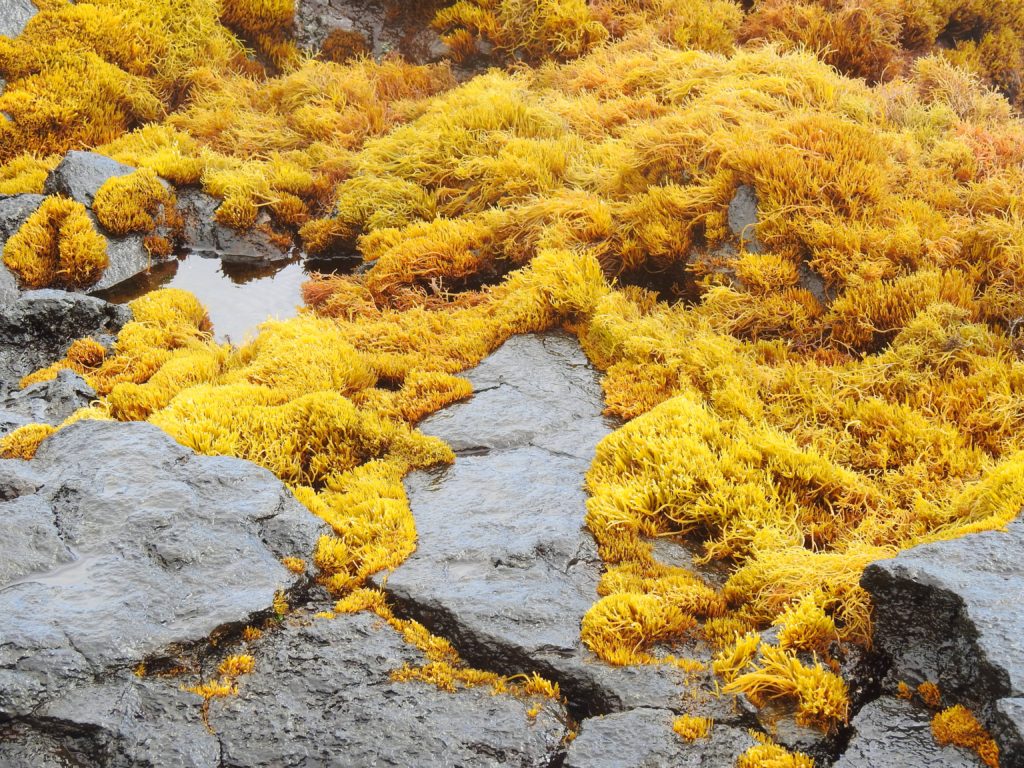
What ingredients are suitable for algae anti-aging and in what they are contained?
Based on the knowledge of how the skin ages, we can derive some methods to create preventive measures for algae anti-aging products.
Vitamin A
Retinoids (vitamin A) reduce fine lines and wrinkles by boosting the production of collagen. They also stimulate the production of new blood vessels in the skin, which in turn has a positive effect on skin tone. Other benefits that can be achieved through vitamin A are the fading of age spots and the softening of rough skin.
As a sustainable source of vitamin A is contained, for example, in Chlorella vulgaris as well as Spirulina platensis. These two microalgae are probably the best known and most widespread microalgae species which, thanks to their nutrient profiles, are already used in food supplements, cosmetics but also pet food.
Antioxidants
Antioxidants help eliminate free radicals and thus prevent aging processes throughout the body and prevent cell damage. This makes them particularly suitable as an algae anti-aging agent, as it benefits the body holistically.
Astaxanthin is one of the strongest and most efficient antioxidants, and is extracted from the microalgae Haematococcus pluvialis. Porphyridium purpureum (formerly P. cruentum) is a microalga which has strong antioxidant properties due to its sulfated polysaccharides. Fucus vesiculosus and Undaria pinnatifida are both marine macroalgae containing fucoidan, which in turn is also a sulfated polysaccharide and has similar antioxidant effects.
Vitamin E & C
Vitamin E can penetrate the skin and help make the skin soft and smooth. Vitamin E is an effective agent to curb the aging of the skin based on UV radiation. Its action as a sunscreen is more effective when vitamin E and vitamin C are used in combination.
Dunaliella salina has a high content of vitamin E and β-carotene (beta-carotene acts as an antioxidant) which makes it doubly suitable for use as an algae anti-aging agent. Nannochloropsis gaditana is just one of several microalgae that contain vitamin C in relevant quantities.
Moisturizer
Decrease in the moisture content of the skin leads to a decrease in protease (or proteinase) activity, and skin peeling may occur. Therefore, moisture is an essential component of anti-aging. To learn more details about the use of algae in moisturizing skin care products you are welcome to check out our blog “Algae Skin Care – Algae in Skin Moisturizing Products“.
What additional benefits do algae still offer for cosmetics?
In addition to the already mentioned advantages that algae have in the field of algae anti-aging, they also offer some interesting benefits.
Many algae accumulate minerals and produce a wide range of vitamins during their growth, making them unique sources of various nutrients. Thus, as already mentioned, they can also be used in moisturizing skin care products and also sunscreens. However, natural pigments can also play their part in making cosmetics more appealing.
In addition, it is a sustainable and natural raw material, which has future potential by relieving the environment without having to do without industrially valuable ingredients.
Algae Anti-Aging – Algae as an innovative raw material for the future
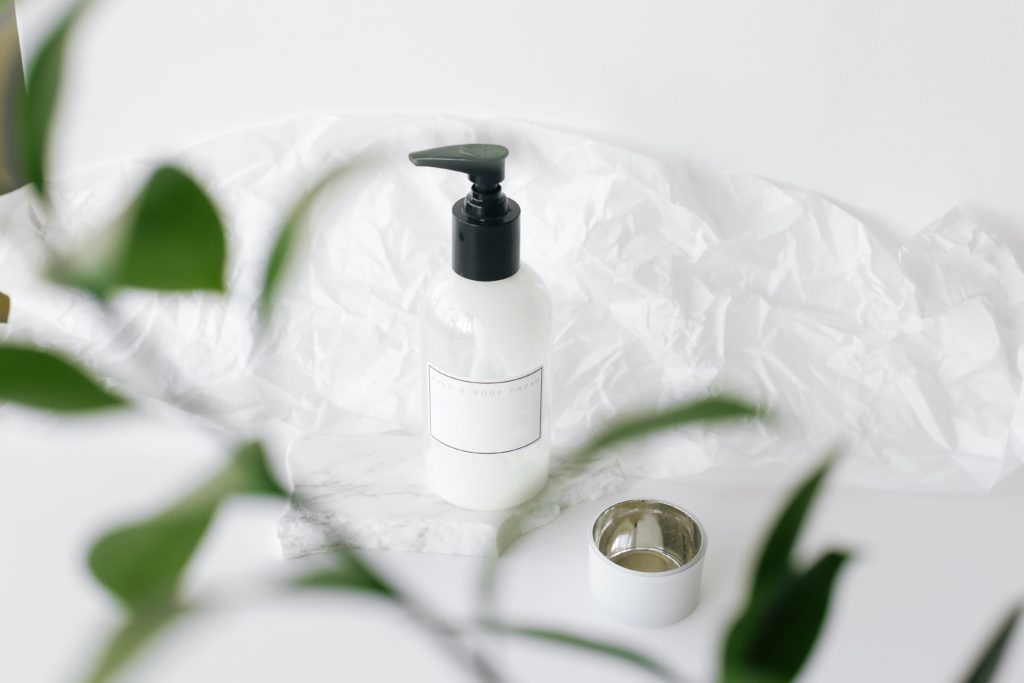
Algae anti-aging agents not only have aesthetic effect but also prevent the aging process of the skin and can promote skin health. As the awareness of natural cosmetic products is constantly growing, algae offer the ideal symbiosis between active and sustainable ingredients for the algae anti-aging agents and cosmetics of the future.
We at Alganex are of course happy to advise and supply any partners in the cosmetics industry. We want to help companies find the optimal algae for their products, while steering together towards sustainable resources.
Sources
The Truth About Anti-Aging Products
https://www.eucerin.de/hautzustand/alternde-haut/alternde-haut-im-allgemeinen
Alkohol: So verheerend wirkt er auf die Haut
https://www.netdoktor.de/bildergalerie/alkohol-so-verheerend-wirkt-er-auf-die-haut/
Wrinkle creams: Your guide to younger looking skin
https://www.mayoclinic.org/diseases-conditions/wrinkles/in-depth/wrinkle-creams/art-20047463
Was sind Freie Radikale?
Is Getting Your “Beauty Sleep” a Fairy Tale?
Anti-aging cosmetics and its efficacy assessment methods
Anti-Photoaging and Potential Skin Health Benefits of Seaweeds
https://www.mdpi.com/1660-3397/19/3/172
Skin anti-aging strategies
https://www.ncbi.nlm.nih.gov/pmc/articles/PMC3583892/
Antioxidant activity of Porphyridium cruentum water extracts for cosmetic cream
https://ui.adsabs.harvard.edu/abs/2020MS%26E..980a2042A/abstract
Do retinoids really reduce wrinkles?
https://www.health.harvard.edu/staying-healthy/do-retinoids-really-reduce-wrinkl

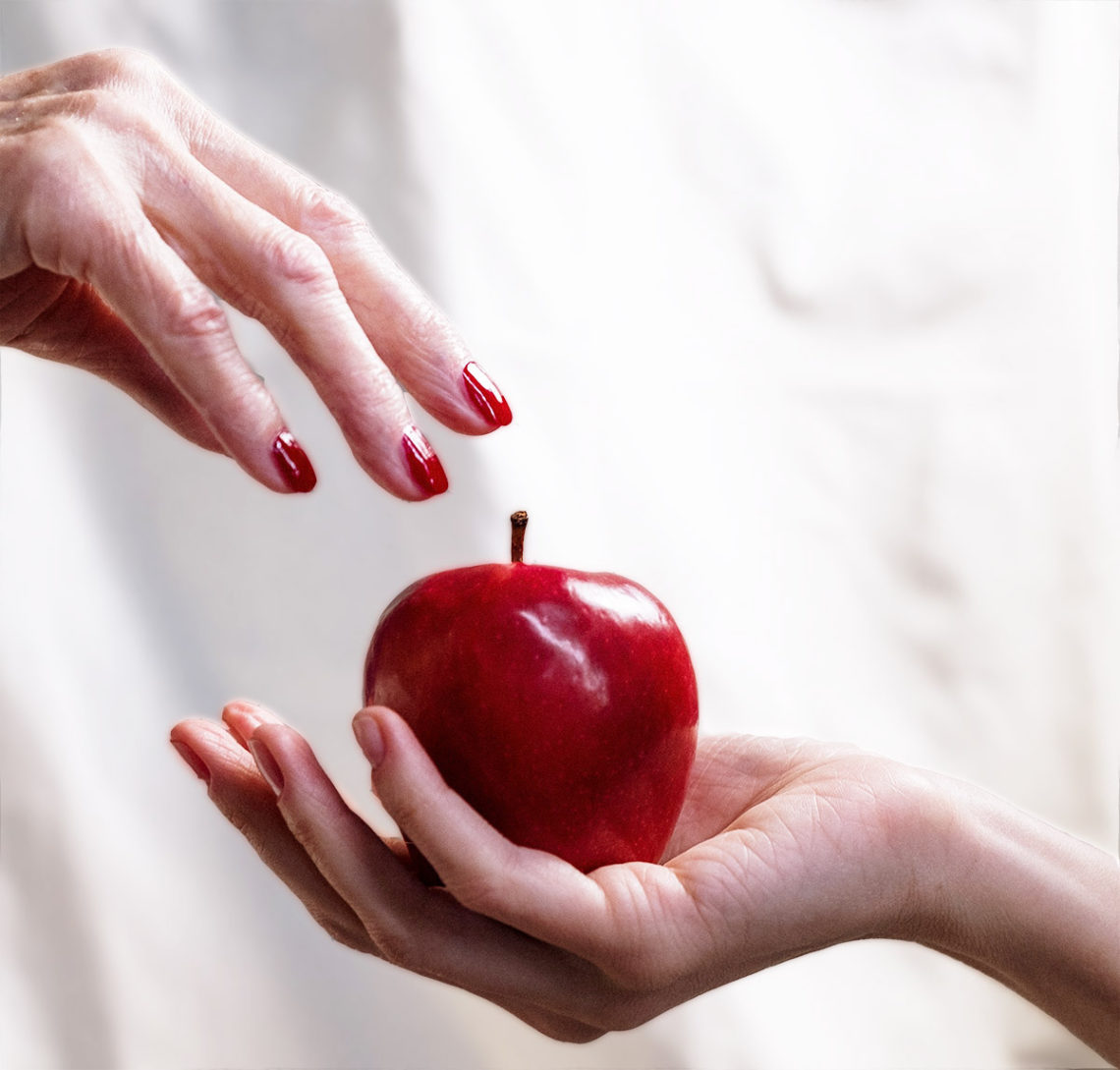



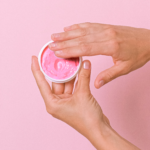
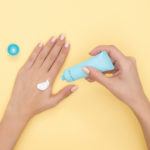
Comments by Pit Wagner